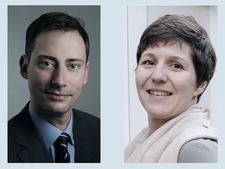-
Topics
subnavigation
Topics
Electromagnetic fields
- What are electromagnetic fields?
- Static and low-frequency fields
- Radiation protection relating to the expansion of the national grid
- High-frequency fields
- Radiation protection in mobile communication
Optical radiation
Ionising radiation
- What is ionising radiation?
- Radioactivity in the environment
- Applications in medicine
- Applications in daily life and in technology
- Effects
- What are the effects of radiation?
- Effects of selected radioactive materials
- Consequences of a radiation accident
- Cancer and leukaemia
- Genetic radiation effects
- Individual radiosensitivity
- Epidemiology of radiation-induced diseases
- Ionising radiation: positive effects?
- Risk estimation and assessment
- Radiation protection
- Nuclear accident management
- Service offers
-
The BfS
subnavigation
The BfS
- About us
- Science and research
- Laws and regulations
- BfS Topics in the Bundestag
- Links
Vitamin-D deficiency can be well prevented without exposure to artificial UV radiation
Joint press release published by BfS, BVDD and DDG
Year of issue 2013
Date 2013.02.14
Date 2013.02.14
Contrary to many allegations, the human body does not need an extra portion of UV radiation from sunbeds in the dark season of the year to cover its demand for vitamin D. Nobody should use sunbeds to prevent a vitamin-D deficiency, emphasised the Deutsche Dermatologische Gesellschaft (German Dermatologic Society, DDG), the Berufsverband der Deutschen Dermatologen (Professional Society of German Dermatologists, BVDD) and the Federal Office for Radiation Protection (BfS) in a joint press release.
With this statement, dermatologists and radiation protection specialists also reject PR campaigns encouraging the use of sunbeds to prevent vitamin-D deficiencies. The promised benefit is opposed by the real risk of serious long-term effects: "The skin doesn’t forget anything – dangerous effects such as skin cancer will only be recognised years later,"
warns Prof. Rudolf Stadler, DDG-President.
In the past 30 years the number of new cases of UV-caused skin cancer has tripled on the grounds of too much exposure to UV radiation. Each year about 24,000 people in Germany contract black skin cancer (malignant melanoma), and the numbers continue to rise. "We cannot accept that the number of new skin cancers increases any further,"
emphasises Dr. Michael Reusch, BVDD-President.
"In sunbeds the UV radiation can be as high as in summer at midday at the Equator. Everyone can easily imagine that this is not healthy,"
explains Dr. Thomas Jung, Head of the BfS Department Radiation Protection and Health. "Therefore children and youths are legally banned from sunbeds."
The body’s vitamin-D level naturally varies with the seasons. Until the end of winter the vitamin-D level is decreasing because the body consumes the vitamin D it has stored in summer. In order for the vitamin D to be available in large enough amounts in winter, it is usually sufficient to go outside in summer on a regular basis and to be on a balanced diet. In good weather, though, one should not forget the appropriate sun protection, even during short stays in the sun. Vitamin-D deficiencies requiring treatment need to be seen to by a doctor who has more efficient treatment methods than additional exposure to UV radiation.
According to current studies, the benefit of sunbeds increase the risk of contracting black skin cancer by 20 per cent compared with persons not using sunbeds at all. The study also shows that the risk for persons using sunbeds before they have reached the age of 35 even increases by 90 per cent. Therefore, measures to prevent skin cancer such as appropriate sun protection and avoiding sunbeds are essential. BfS, DDG and BVDD and eleven other medical and scientific authorities and organisations have thus joined forces in a UV alliance and together work for dealing with UV radiation in a positive and health conscious manner.
State of 2013.02.14



